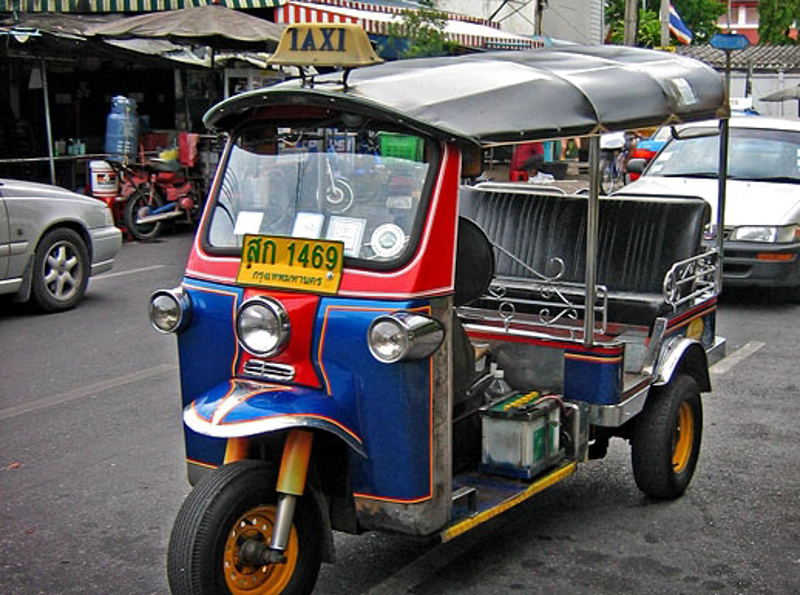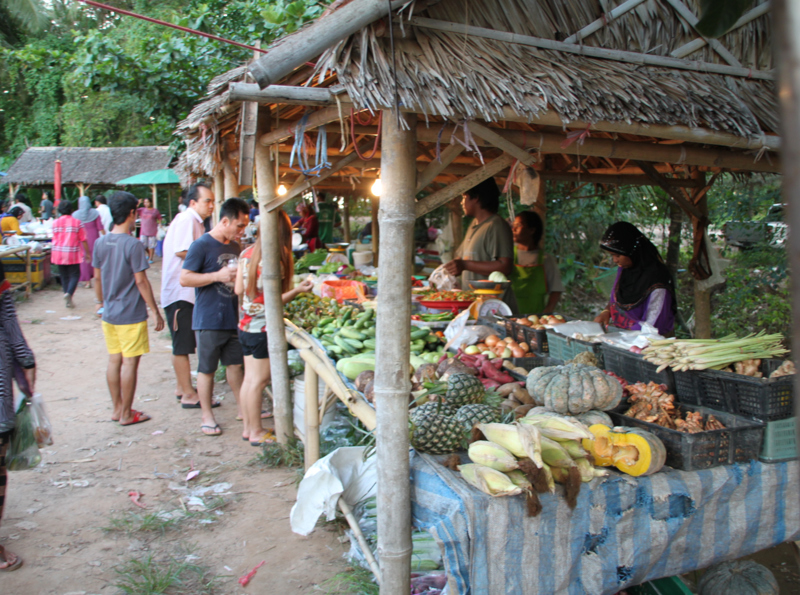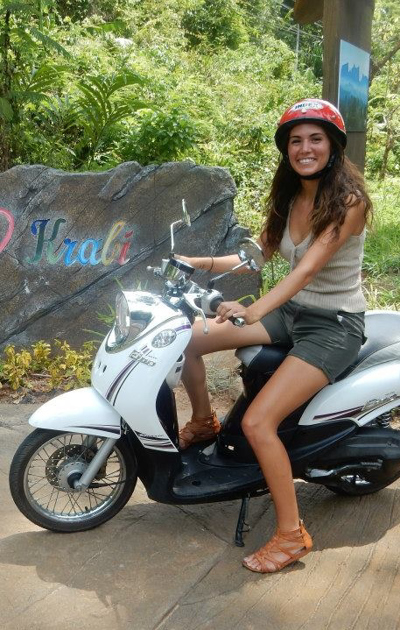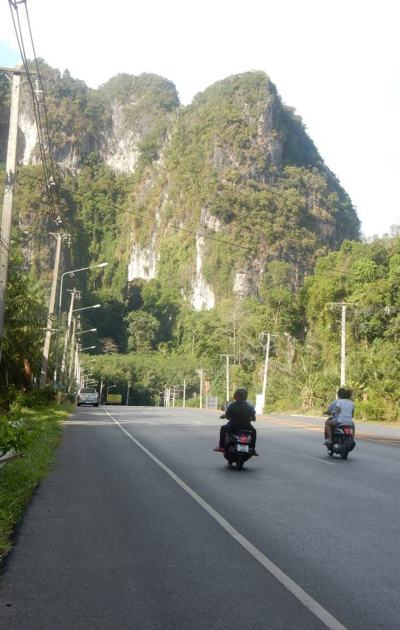Natali Euale
As a fourth year student of Anthropology and a person who has backpacked through many countries, both evidently altered by tourism development and those relatively free from such development, I have become really interested in how tourism development can impact the 'authenticity' of places, thereby altering one's 'sense of place' and 'place identity'.
Welcome to Koh Lanta, Thailand:
Immediately after getting off the ferry that transported me from Aonang, Krabi District, Thailand, to my new destination, the small island of Koh Lanta, I hear the honking of tuk tuks (three wheeled motorized vehicles used as taxis in Thailand) by the drivers trying to get the attention of the new group of travelers getting off the boat. I push through the crowd of eager tourists trying to get off the pier and hitch a ride on a tuk tuk to their reserved hotel or beachfront
natali-euale
2 chapters
15 Apr 2020
Shifting Perceptions of Place in Thailand: The Power of Tourism in Constructing 'Place'
Koh Lanta, Thailand
As a fourth year student of Anthropology and a person who has backpacked through many countries, both evidently altered by tourism development and those relatively free from such development, I have become really interested in how tourism development can impact the 'authenticity' of places, thereby altering one's 'sense of place' and 'place identity'.
Welcome to Koh Lanta, Thailand:
Immediately after getting off the ferry that transported me from Aonang, Krabi District, Thailand, to my new destination, the small island of Koh Lanta, I hear the honking of tuk tuks (three wheeled motorized vehicles used as taxis in Thailand) by the drivers trying to get the attention of the new group of travelers getting off the boat. I push through the crowd of eager tourists trying to get off the pier and hitch a ride on a tuk tuk to their reserved hotel or beachfront

resort. I look around and see sings in English directing visitors to the information desks or to tourist guide services. The sounds of Thai people speaking in broken English and waving their island maps in the air to entice visitors to purchase an 'authentic' tour of the island fill the air. I continue to move past all the noise and commotion and I find myself walking down a paved road that is eerily void of any trees or people for that matter.
Tuk Tuk parked on the side of the Road in Saladan Pier, Koh Lanta, Thailand.
I can sense a spontaneous and quiet change in my perception as I walk on this empty road, where all that is visible are signs in English pointing to 'American style breakfast', "Authentic Italian Cuisine' and multiple 'Spice of India' eating places. I think to myself, feeling very out of place, where am I? Is this strip of paved road filled with multiple signs catering to 'international' travelers, representative of Thai identity? Or is this considered a placeless place, or non-place? An important question to consider when trying to fathom this complex topic is posed by Clifford Geertz (1988:131) when he asks "what happens

when reality is shipped abroad?" This strip is, paradoxically, a distinctive place comprised largely of cultural fragments of other places. Similar geographic confusions can be found, albeit in a less sophisticated form, in the food court of shopping malls. Is this place a reflection of Clifford Geertz's (1988) argument that people are living more prominently in an enormous collage, among migrations of cuisine, of architectural styles, and of people? I came to the conclusion that this was not in itself a 'non-place', it was more of a collage of several place identities, or as Susan Hanson (2001) would call it, place plagiarism. The unprecedented scale of recent global population movements for both migration and tourism seems to have blurred conventional ideas about sense of place, location and context (Geertz 1988). It appears as though almost everywhere has been uprooted, along with customs, culture and landscape, and these are now available for transformation, relocation and consumption almost anywhere in the world (Geertz 1988). This place plagiarism was clearly marketed towards outsiders, not for local consumption. It became rather difficult to see this place as endemic of traditional Thai identity and so, I could not develop a significant place attachment.
Sensuous Immersion versus Detached Observation:
As I continue walking feeling a bit discouraged from the lack of connection to place, or 'sense of place' I feel in Koh Lanta so far, I become aware of a change in landscape. As I move away from the busy streets of Ban Saladan Pier, the previous landscape is now being replaced by thick palm
trees, green forested hills and people in small wooden huts selling seafood and an assortment of colorful Thai curries. The diversity of Thai identity becomes more evident in this place as the smell of fresh fish fills the air while I walk past fishermen pulling wagons filled with ice and their catch of the day, and is then quickly replaced by the smell of Halal foods being prepared by Muslin women over the fire. As I become embedded in this landscape I become aware of the tensions within landscape. The tension between sensuous immersion and detached observation seems to create different perspectives on the landscape (Wiley 2007).
I find myself observing the place I am in, connecting my mind, body and spirit to land. I walk into a nearby street market called 'Klong Nin Market' and move past the various vendors selling an assortment of fruits, vegetables, fish, and sticky rice balls. I am no longer separate from the landscape, a detached observer trying to make sense of my surroundings. As I interact with the street vendors, trying to communicate in Thai to the best of my abilities, I see a monkey leaping from one palm tree to the next. One of the younger vendors tells me they train the monkeys to get the good coconuts out the palm trees in order to sell them in the market. I am amazed as I watch this monkey shake the coconut beside its ear and listen for a particular sound. After a few seconds it seems the monkey has determined this is a 'good' coconut and throws it down from the palm tree to the human standing at the bottom with a half filled wagon. Is the monkey and the palm trees that I see at a distance separate from this place? Am I 'in place', while that which I see at a distance is part of the landscape ? Perhaps a place in the landscape cannot be 'cut out' from the whole; rather, each place embodies the whole at a
particular nexus within it (Ingold 1993). However, there was a uniqueness about this place that I did not experience while being in Ban Saladan Pier. The feeling of detachment to place has been replaced by an overwhelming awakening of my senses, where food, smells, language, humans, non-humans, and the sentient natural surroundings come together to construct a specific place and place identity.
Klong Nin Market in Koh Lanta.
Perhaps it is true, as David Abram (1996) would argue, that specific phenomena continually demanding our focus such as the many human artifacts which we commonly encounter (roads, automobiles, etc.), lose their distinctive fascination. These 'inauthentic' phenomena that can be seen anywhere in the world thus start to slip into the background of one's consciousness; while organic beings (animals, trees, etc.)--all begin to display a unique existence and sentience, seemingly speaking their own languages, awakening and revitalizing ones senses (Abram 1996).


The Enchantment of the Mountains:.
It is nearing noontime as I walk out of the crowded market holding bags filled with fragrant dragon fruits, mangoes and black bean sticky rice balls. The streets are now bustling with life as vendors on mopeds try to balance themselves while the weight of the piles of boxes tied to the back of their moped sway them from side to side. It is not uncommon to see children as young as eleven driving a moped with their younger siblings
holding on to them from behind, nor is it uncommon to see families of five all pressed up against each other on one moped. I came to the conclusion that renting a moped would be the simplest and fastest way to get around. I had already learned the basic etiquette of riding a motorized vehicle in a place where there are no real traffic laws, from having to travel by scooter while being in Krabi, Thailand. It took me a little effort to remember to drive on the opposite side of the road, but after a few weeks of driving on many lengthy roads it did not seem so foreign to me. The experience of driving on a scooter through the many densely covered hills, rolling like waves in the horizon, is something that one can never take for granted. The mossy green warmth of the mountains seem to envelop you and you cannot help but get lost in your own thoughts as you imagine how this landscape must have looked to the first people that inhabited this land, prior to any presence of a built environment.
Share your travel adventures like this!
Create your own travel blog in one step
Share with friends and family to follow your journey
Easy set up, no technical knowledge needed and unlimited storage!